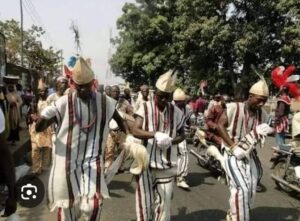


Ebira dances.
Photo credit; Google.
The Ebira people, primarily located in Kogi State, Nigeria, north central Nigeria have a rich cultural heritage and history. They are believed to have migrated to their current location from the southeastern region of Nigeria, settling in what is now known as the Ebira land.
Historically, the Ebira were involved in agriculture, trade, and craft-making, developing a society organized around clans. The region is characterized by its hilly terrain and fertile lands, which supported farming activities.
The Ebiras have maintained a strong sense of identity, with their language, Ebira, and traditional practices playing significant roles in their community life.
They have also experienced external influences from neighboring ethnic groups, as well as colonial and post-colonial dynamics, which have shaped their socio-political landscape.
In recent decades, the Ebira extractions have been active in Nigeria’s political scene, contributing to the broader narrative of Kogi State’s development.
Their cultural practices, festivals, and art continue to be important aspects of their identity, showcasing a blend of tradition and modernity.
Edited by Dada Ahmed.


